The FBI has still not verified the authenticity of Hunter Biden’s laptop nearly four years after its initial refusal to do so, causing social media companies to suppress stories about it before the 2020 election. The bureau has remained silent on the matter, declining to comment on whether it regrets not acknowledging the laptop’s authenticity now that it has been introduced as evidence in Biden’s criminal gun trial. The New York Post initially revealed the laptop’s existence, alleging that it contained details of the Biden family’s influence peddling scheme.
Social media giants such as Facebook and Twitter took swift action in response to the New York Post story, with Twitter banning links to the story and Facebook reducing the reach of posts about the laptop until it could be verified by independent fact-checkers. The Atlantic reported that Facebook’s decision was based on an FBI warning about disinformation leading up to the election. This fact was highlighted in a letter to FBI Director Christopher Wray, questioning why the bureau did not verify the laptop’s authenticity despite knowing it was not part of a Russian disinformation campaign.
Although outlets like the New York Times and Washington Post eventually confirmed the authenticity of the laptop’s contents nearly two years after the initial story broke, FBI Director Christopher Wray defended the bureau in a congressional hearing, calling accusations of favoritism towards the Biden family “ludicrous.” Wray refused to address specific questions about the Biden investigation, maintaining a policy of silence that continues to this day. The FBI has directed inquiries about the laptop to the special counsel’s office, perpetuating the lack of clarity on the matter.
The Judiciary Committee letter to Wray in the aftermath of the laptop controversy criticized the FBI for failing to inform social media companies that the Hunter Biden laptop was real and not Russian disinformation. The letter underscored the impact of this silence, suggesting that millions of Americans were deprived of important information before the 2020 election due to social media suppression. Despite the FBI having had access to the laptop since December 2019, the bureau declined to confirm its authenticity when asked by social media companies, leading to restrictions on the story’s dissemination.
The ongoing silence from the FBI regarding the Hunter Biden laptop has raised questions about transparency and accountability within the bureau. The lack of a definitive statement on the laptop’s authenticity has allowed speculation and controversy to persist, impacting public perception and trust in law enforcement agencies. The FBI’s refusal to verify the laptop’s contents has also brought into question its handling of potentially sensitive information and the implications for future investigations. The continued ambiguity surrounding the laptop highlights the challenges of navigating information in the digital age and the complexities of balancing national security concerns with the need for transparency and accountability.


